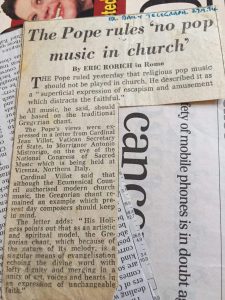
The Dominican friars in DC sing the English version of the great carol written by their brother, Blessed Henry Suso.
Defeat, Thwart Me?
In one of his “terrible sonnets,” Gerard Manley Hopkins pleads with God for justice. He complains to God: “Wert thou my enemy, O thou my friend / How wouldst thou worse, I wonder, than thou dost / Defeat, thwart me?”
In our days, God could easily be thought to say the same to many Church leaders. “How could you worse defeat the plans of My heart, the salvation of souls?”
How many generations of the sheep now lie panting and lost for a lack of good shepherds, or rather with so many bad shepherds mixed in with the good?
How many grossly expensive and completely ineffective pastoral initiatives have succeeded each other in the name of innovation?
How many weeks pass by in most parishes with few or no confessions heard?
How many religious communities have collapsed into nothing?
How many thoughtlessly sacrilegious marriages and Communions go unaddressed?
How many Catholic congregations are subjected to almost flippantly casual ceremonial practices and heretical hymnody?
How many good men and women have been thwarted in their vocations because of their devotion to God and their attachment to the truth?
Can it be that the fruits of the maverick postconciliar reforms are still unrecognized: the empty churches, the invincible ignorance, the effective atheism?
A U-turn is not regression if it re-orients us to the goal. There are enough present-day oases of good Catholic practice and teaching, and their concomitant fruits, to know what has been lost, and what needs to be recovered.
O Thou Lord of life, send our roots rain.
Rorate Caeli Desuper
Msgr. Charles Pope discusses the great Advent hymn.
It is a plaintive hymn that recalls our desperate need for a savior and concludes with consolations from God, who has heard our cries and hastens to save us.
Much more here.
Listening to Young People: Sex Abuse Crisis Nearly Six Months After McCarrick Removal Edition
Consistent teaching
It is one of those ecclesial matters that comes up with some regularity.
No, opera is not appropriate for Mass.
No, a piano/ violin concerto is not appropriate for Mass.
No, an ordinary inspired by The Girl from Ipanema is not appropriate for Mass.
No, Let It Be and Sunshine On My Shoulders are not appropriate for Mass.
As a parish music director I found the distinction between sacred and secular was most helpfully put this way: “At your relative’s funeral Mass we should sing Church songs, not radio songs.”
Lest this seem snobbish, opting for highbrow vs. lowbrow tastes, the distinction could just as easily be made between Church songs and concert hall music, and often should be, for weddings.

Lost and found: the English choral tradition
In a new book review, Michael White outlines a history of how the English choral tradition was disrupted by the English Reformation and reconstructed in the 1900s, partly through Catholic influence:
On Christmas Eve, the famous Festival of Nine Lessons and Carols will be broadcast from King’s College Chapel, Cambridge, and listeners throughout the world will think how wonderful it is that, in these crazy times […] the great English choral tradition carries on: soothing, consoling, with the same exquisite beauty that it’s cultivated since the Middle Ages.
The idea is an attractive one, but not quite true. And this book tells you in no uncertain terms how far from the truth it is.
The review is on-line at the Catholic Herald.
Only for your love alone
What a relief it is when pretense and romanticism are set aside and we come face to face with reality in its starkness and candor.
For those who work for the poor, not with soundbites or ideologies or doctrinal compromises but in reality, romanticism passes early and often. As St. Vincent de Paul wrote to his spiritual children:
You will find out that Charity is a heavy burden to carry, heavier than the kettle of soup and the full basket. But you will keep your gentleness and your smile. It is not enough to give soup and bread. This the rich can do. You are the servant of the poor, always smiling and good-humored. They are your masters, terribly sensitive and exacting masters, you will see. And the uglier and the dirtier they will be, the more unjust and insulting, the more love you must give them. It is only for your love alone that the poor will forgive you the bread you give to them.
If the corporal works of mercy, in which we give people that which we and they and all agree on the desirability of the gift given, can meet with anger, how much more are the spiritual works of mercy resisted–particularly the three in which we must communicate to one another his or her inadequacy:
- Instruct the ignorant
- Counsel the doubtful
- Admonish the sinner
Rarely will the beneficiary of these merciful acts feel them as unmitigated love and mercy.
Certainly some of the hesitancy will be due to pride, hardness of heart, indolence, or attachment to sin. And yet is is incumbent upon those of us who are exercising this type of mercy to examine our ways. As a sinner, anyone of us who acts to rouse the Christianity of others has inward access to the paradigmatic Instructor, Counselor, and Admonisher: the Holy Spirit. And the Holy Spirit convicts us without condemnation.
Do we do likewise?
Resistance is necessary, because ultimately our enemy is not human, but the father of lies. There was a naive time when it may have seemed appropriate to participate in the pretended rapprochement of “The Common Ground” movement. There may have been time when it seemed appropriate to wonder whether we were instigating “liturgy wars” and “culture wars,” rather than simply upholding and teaching the truth. Were we “rigid?” Where we hypocrites? Were we Pharisees?
The McCarrick affair has thankfully put an end to the need for self-examination on points like this. It turns out that his rejection of truth, beauty, and goodness in other aspects of ecclesial life was perfectly consonant with a life of unrepentant, predatory sin. It made a terrible kind of sense. And so we must resist and admonish, with a new clarity and resolve. As St. Paul says, “Let your love be sincere.”
So what should our response be?
1. Practice the works of mercy–all of them.
2. Confess and repent.
3. Practice the virtues that are opposites of the vices of ecclesial corruption.
4. Pursue and promote the good, the true, and the beautiful.
